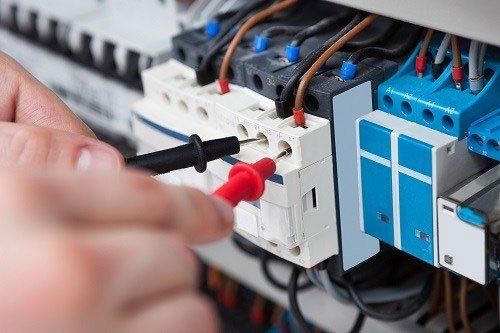What do I need to know about Electrical Safety?

Electricity is invisible but has the potential to be extremely dangerous, even life threatening. It is easy to forget to check the condition of electrical installations for damage or wear and tear. Electricity can kill or severely injure people and cause damage to property. However, you can take simple precautions when working with or near electricity and electrical equipment to significantly reduce the risk of injury to you, your workers and others around you.
Why is Electrical Safety Important?
It is vital not to underestimate the dangers involved with electricity. Injuries as a result of electricity can cause serious harm, and even be fatal. In the UK in 2019 there were approximately 19,300 accidental domestic fires of electrical origin, according to Government statistics, which were caused by:
- Faulty appliances and leads: 3667 (25.9% of electrical fires)
- Faulty fuel supply: 2152 (15.2% of electrical fires)
- Misuse: 6594 (46.5% of electrical fires)
A voltage as low as 50 volts applied between two parts of the human body causes a current to flow that can block the electrical signals between the brain and the muscles. This may have a number of effects including:
- Stopping the heart beating properly
- Preventing the person from breathing
- Causing muscle spasms
The exact effect is dependent upon a large number of things including the size of the voltage, which parts of the body are involved, how damp the person is, and the length of time the current flows.
Top 3 Electrical Hazards?
- Poor Wiring and Defective Electric Wires:
Good quality wiring that conforms to safety standards is very important for safety. Bad wiring can increase the chances of fires, power surges, and other serious consequences. Damaged, worn or corroded electrical wires can also increase the chances of electrical accidents. - Exposed Electrical Parts:
Examples of exposed electrical parts include temporary lighting, open power distribution units, and detached insulation parts on electrical cords. These hazards can cause potential shocks and burns. Secure these items with proper guarding mechanisms and always check for any exposed parts to be repaired immediately. - Overloaded Circuits:
Using wires with inappropriate size for the current can cause overheating and fires to occur. Use the correct wire suitable for the operation and the electrical load to work on. Use the correct extension cord designed for heavy-duty use. Also, do not overload an outlet and use proper circuit breakers. Perform regular fire risk assessments to identify areas at risk.
It is always best to avoid do-it-yourself electrical work and get professional, qualified electricians to perform repairs and undertake maintenance on a regular basis to ensure electrical safety.
What is the Most Common Electrical Injury?
A very common injury related to electrical incidents is burns. Exposure to electricity means that you can be burnt by touching hot metal which has been heated by the electricity even if you have not been electrocuted. Other injuries can be caused by falling or being thrown back, or by flying objects, sharp exposed wires or melted dripping plastic. Children can be in danger of electrical injuries from sockets, playing with electrical equipment or through damaging equipment or wires. Care and precautions should be taken anywhere children and electricity could come into contact with each other.
Our Top 5 Electrical Safety Tips:
- Check that you are using the correct wattage in all your appliances
- Never overload an electrical socket with too many plugs
- Replace damaged electrical cables; have a professional repair appliances
- Never touch electrical appliances with wet hands
- Wear protective equipment whilst using power tools
- Find out where the internal wirings is located before you do any work on walls
Repairs should only be carried out by
someone who has the necessary skills, knowledge and experience to carry out the
work safely. Consider whether electrical equipment, including portable
appliances, should be more formally inspected or tested by a competent person.
Also think about the intervals at which this should be done.
For more information contact
Home-Check on
:
Telephone: 01698 881016










